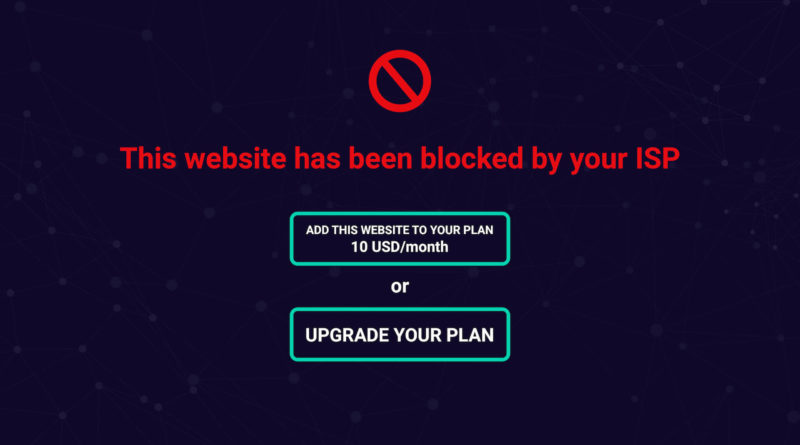Internet Starting to Shutdown ; FCC Repeals “Net Neutrality” – Free Speech is Dead
Internet to Shutdown Starting Tomorrow ; FCC Repeals “Net Neutrality” – Free Speech is Dead

Supporters of the current net neutrality warn that the end of the Obama-era rules will spell doom and gloom for internet freedom and free speech. Rather than treat all web traffic equally, telecom companies will be free to carve up the web into “lanes,” , creating slow and fast streams, costing consumers more time and money, they say.
Ajit Pai, chairman of the Federal Communications Commission, has played down the fears and said there are still rules in place to punish companies which harm consumers. Yet he also opening mocked net neutrality supporters and their concerns in a public video released last week. Raising the question is he actually being truthful when he says “you can still enjoy your good ol’ internet” or is he just tea bagging the nation.
The truth may be somewhere in the middle. Much is still unknown about how this will play out now that the FCC has repealed net neutrality.
Do You Want to Lose the Internet? Because this is how you Lose the Internet!
It is still yet to be announced how these laws and changes will actually effect the average internet user.
With both those for and against Net Neutrality seem to have no worries about the future of the Internet, apparently no one else does either. With the average American knowing very little about the vote and its changes to their Internet or ISP.
While the debate rolls on, here are some ways the FCC’s vote could impact you:
Will consumers have to pay more for internet service or content?
Don’t expect any immediate changes to your wireless bill or web subscriptions because they can’t figure out how to screw you over that fast. But over the coming months and years, there are two ways the internet could become more expensive.
In the near term, internet-service providers, or ISPs, could charge content providers like Netflix and Spotify for the privilege of streaming their videos and music over internet “fast lanes,” free of interruption. Those services could in turn pass on the added cost to consumers by raising their subscriptions a few bucks a month. No big deal, we already pay more than any other 1st world country in the world for “High Speed” internet.
So-called “paid prioritization” deals could be challenged by antitrust regulators if they are done to limit competition, rather than to pay for the cost of managing high-speed connections. Yet with regulators usually holding closer allegiance to the industries they are supposedly regulating who we ask will enforce these rules.
Further out, the removal of net neutrality in theory could inhibit competition for services. With fewer companies competing to offer broadband and fewer websites delivering content, prices for all of these things could go up. But how could we pay more when we already pay more than any other nation for our internet?
Can service providers like Comcast and Verizon slow down video streaming?
The largest ISPs say they have no plans to throttle website speeds. But they have before. And they have stated that they would do it if they could.
In 2008, the FCC ruled that Comcast had slowed access to BitTorrent because the peer-to-peer downloading site had “become a competitive threat to cable operators.” Comcast sued and had the order overturned, but the event created the impetus for the drafting of net-neutrality rules to prevent throttling.
Will ISPs be able to censor content they don’t like?
The biggest telco companies also own TV studios, websites and other businesses that compete for the attention of web users. Without net-neutrality protections, they could try to tip the playing field to their advantage by blocking access to sites with which they compete.
This happened last year in Morocco, where telecommunications companies worked together to block access to web-calling services like Skype because it competed with their phone businesses.
In the U.S., such a brazen move could provoke intervention by the Justice Department or the Federal Trade Commission, which both police unfair and anticompetitive business practices. Yet who in the Federal Trade Commission or the Justice Department is going to protect you from further consolidation of wealth and power into legislation that focuses on just that. Aiding big telco companies in controlling and regulating your information and data.
What measures can people take to try to avoid having their internet slowed or censored?
Read the fine print on user agreements. The FCC will require service providers to notify users if they block, slow down or give preferential treatment to any services.
And we all do so good with the fine print already because we are so informed and knowledgable. Im sure this is going to be just fine.
Is it at all possible we might benefit from the rollback of net-neutrality rules?
Some say services could become cheaper to consumers through so-called “zero rating” deals offered by wireless carriers. These deals include free access to high-bandwidth apps and sites like Netflix and HBO that don’t count toward a user’s mobile-data plan.
Though critics say these deals violate the principles of net neutrality because they let carriers give preferential treatment to some services, the FCC said earlier this year that it wouldn’t target companies making such offers, especially because low-income people could benefit. Our government might offer some kind of social free internet for poor people to stay informed. That sounds legit.
The FCC chairman appointed by President Trump, has framed the repeal as getting the government to “stop micromanaging the internet.”
The move is supported by the telecom industry, which claims existing regulations threaten to hamper broadband investments and innovation. Telecom companies have obviously been such big innovators of our era its important we keep this avenue open to them in the future.
Technology companies and consumer advocacy groups have loudly protested the repeal effort for months, both online and offline, arguing it could spell the end of the internet as we know it.
But what does all that mean and what’s really at stake.

WHAT EXACTLY IS NET NEUTRALITY?
The net neutrality rules were approved by the FCC in 2015 amid an outpouring of online support. The intention was to keep the internet open and fair. Hence “net neutrality”.
Under the rules, internet service providers are required to treat all online content the same. They can’t choose to speed up or slow down traffic from specific websites or apps, nor can they put their own content at an advantage over rivals.
This means Comcast can’t just choose to slow down a service like Netflix to make its own streaming video service more competitive, nor can it try to squeeze Netflix to pay more money to be part of a so-called regular internet.
Vimeo general counsel Michael Cheah told CNNMoney: the point of the rules is “allowing consumers to pick the winners and losers and not have the cable companies make those decisions for them.” Oops, too late for that I guess. So …
WHY IS NET NEUTRALITY SUCH A BIG DEAL?
“Everyone uses the internet and everyone uses these tech platforms,” Michelle Connolly, a former FCC official who supports Pai, previously told CNNMoney. “So issues that are coming up right now, people are seeing from a very personal perspective.”
If there’s one thing that both sides can agree on, it’s that the internet is increasingly central to our lives. Any change to how it’s regulated is a hot button issue.
SO HOW WILL INTERNET PROVIDERS BE REGULATED?
The FCC is doing away with rules barring internet providers from blocking or slowing down access to online content. The FCC would also eliminate a rule barring providers from prioritizing their own content.
In the absence of a firm ban on these actions, providers will be required to publicly disclose any instance of blocking, throttling or paid prioritization. It will then be evaluated based on whether or not the activity is anti-competitive.
What does Trump say about the situation?

As part of this shift, oversight of internet protections will shift from the FCC to the Federal Trade Commission.
Oversight of internet protections will shift from the FCC to the Federal Trade! Wait what!?!? Did anyone else just read this? What does that mean?
Maureen K. Ohlhausen, the acting head of the FTC, said in a statement Monday that the agency is “committed to ensuring that Internet service providers live up to the promises they make to consumers.”
But consumer advocacy groups are less than optimistic.
“Not only is the FCC eliminating basic net neutrality rules, but it’s joining forces with the FTC to say it will only act when a broadband provider is deceiving the public,” Chris Lewis, VP at Public Knowledge,
“Not only is the FCC eliminating basic net neutrality rules, but it’s joining forces with the FTC to say it will only act when a broadband provider is deceiving the public,” Chris Lewis, VP at Public Knowledge, a nonprofit that focuses on the open internet, said in a statement this week.
“This gives free reign to broadband providers to block or throttle your broadband service as long as they inform you of it.”
AND HOW WILL REPEALING NET NEUTRALITY AFFECT ME?
First, it’s important to say what won’t happen: Billion-dollar services like Netflix are not going to disappear overnight without net neutrality. They have large enough audiences and bank accounts to survive in a changing regulatory landscape.
Will I See This?

In reality net neutrality advocates worry how this repeal will impact the future of the internet. Upstart companies may struggle to strike deals with providers and pay up to have their content delivered faster.
That could fundamentally alter the future internet landscape.
The repeal could change how customers are billed for services, both for good and bad. T-Mobile, for example, was criticized by net neutrality supporters for effectively making it cheaper for customers to stream videos from Netflix and HBO, putting other video services at a disadvantage.
Without net neutrality, internet providers may pursue similar offers more aggressively, which would likely be viewed as a positive by consumers.
Yet, some fear it’s also possible internet providers will one day begin charging customers more to access services like Netflix that are currently included as part of your monthly bill.
SO IS THIS A DONE DEAL?
Kinda. But not quite. It’s very like this issue could end up being decided in court, or perhaps even by legislation in Congress. Only time will tell.
“Whenever we do anything big and major, people go to court,” a senior FCC official said last month. “I certainly would not rule that out.”
Until then .. stay informed Truth Bearers.




